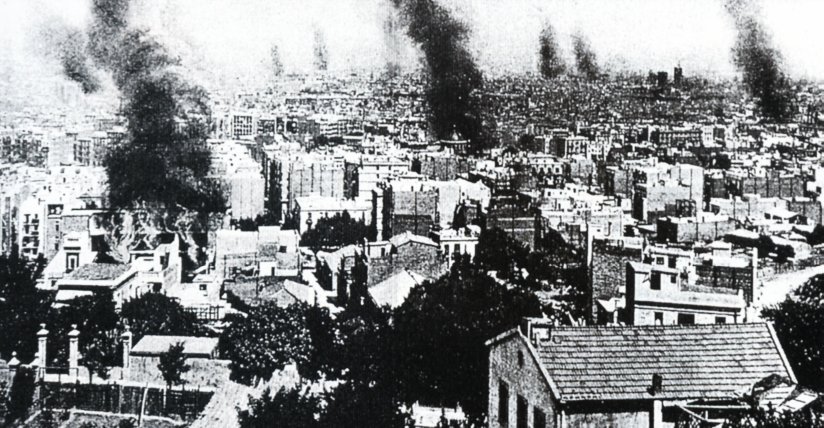They don't even have to do that. All they need to do is show they are serious about cracking down on left-wing violence, and that they are not a Trojan Horse for the Red Left to overthrow the Republic.
Unfortunately, Azaña was obsessed with anti-clericalism and anti-monarchism, and since the Reds were "sound" on those points, he refused to acknowledge their underlying hostility to the "bourgeois democracy" of the Republic.
If we go this way, you don't have a civil war if the landowners, conservative generls, clergy, ndustrialist and co. had accepted they had been ruling an oppresive state that kept down peasants and workers and generated untenable inequalities, so they would have accepted progressive reforms before instead of pushing the masses towards revolutionary action

Unfortunatelly history rarelly works that way. But damn the oppressed for not accepting their opression.
I think that this thread is ignoring the increasing polarisation of Spanish politics throughout the republic. The idea that the popular front would or could ditch the left and move to the centre is so unlikely in the increasingly fevered atmosphere of 1936. A narrow victory is seen as a victory not as an opportunity for reconciliation. Largo Cabellero for example dramatically increases the tone of his rhetoric such that this once moderate socialist is being described as the Spanish Lenin.
Re the anticlerical violence which contributed to the civil war, it was most extreme in the towns but it was rural as well indeed the only part of republican spain not really affected was the basque area where basque nationalism was at home with the catholic clergy.
Throughout the second spanish republic there were politicians of goodwill who acted in the best interests of everyone (Gimenez Fernandez the right agriculture minister who endeavoured but failed to introduce a measure of land reform) but their efforts were continually stymied by the forces they were up against.
Personally I think that the best way forward would have been for the Azana government in 1931 to make a strategic decision on whether to accommodate the church or the army, my money would be on the army as there were progressive elements there.
Those are good points. It was a very difficult political climate to sail. It was like that all around Europe in the period, and in Spain there were sectors whose privileges were too obvious to be ignored (mainly the Church and the southern landowners) In the case of the church the monopoly over education and the sponsor of the state, and in the case of the landowners their staunchy opposition to land reform. The tenssions created by these situations, and others, had led to previous events that created resentment. The repression of the landless peasants in Extremadura in the late 20's was brutal, the repression of the asturian miners in 1917 and 1932 was even more brutal. Thousands of union members were in prision...no Frente Popular government can ignore the bad blood accumulated for decades in the left after being always in the receivng end. The strategy should go taking into consideration this and fnd a way to adress the issue with the maximun possible level of moderation, but at some point confrontational measures are going to be taken. There is also the issue of the forces that opposd the republic since the first moment, before any revolutionary threat to blame, which didn't help to reconciliation.
I think Azaña looked actually to accomodate the army (he was minister of the army) but again you have the old problems. Useless officers entrenched in their privileges opposing any meainingful reform to make a more efficient army, let aside a more democratic one. An army with low prestige after their "glorious" campaings in the Rif, in a war where the class divide was reflected in the death toll... I obviously have bias, but blaming the left for attempting to take down outdated and immobilist power structures is rather unfair and ignores spanish history since 1815 till 1936, specially since the bourbonic restoraton. Every reform attempt in that period faced unflexible opposition from certain social sectors, and every progressive regime was toppled down by the same forces.The methods and political calculations are another matter, and probablt many weren't the most clever, but considering the context, having a cold mind was not easy. So, yeah, even a narrow victory was seen like "finally, this is our hour, let's make them understand how does it feel"
PD: The influence of the anti-clerical violence sparking the war is overstated. There was also anticlreical violence under the monarchy and it didn't led to a civil war. And when I say anticlerical violence, I mean this:
Semana Trágica, 1919. Churches burn in Barcelona
For some reason nobody accused the monarchic regime for this like they did with the Republic. The forces that opposed the republic and its reforms opposed them for other reasons.
